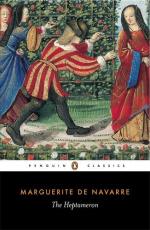In 1507, when in his eighteenth year, he accompanied the army which the King led against the Genoese, and conducted himself bravely; displaying such courage, indeed, at the battle of Agnadel, gained over the Venetians—who were assailed after the submission of Genoa—that Louis XII. bestowed upon him the Order of St. Michael. It was during this Italian expedition that his mother negotiated his marriage with Margaret of Angouleme. The alliance was openly countenanced by Louis XII., and the young Duke of Valois—as Francis of Angouleme was now called—readily acceded to it. Margaret brought with her a dowry of sixty thousand livres, payable in four instalments, and Charles, who was on the point of attaining his twenty-first year, was declared a major and placed in possession of his estates. (1) The marriage was solemnised at Blois in October 1509.
1 Odolant Desnos’s
Memoires historiques sur Alencon,
vol. ii. p. 231
Margaret did not find in her husband a mind comparable to her own. Differences of taste and temper brought about a certain amount of coolness, which did not, however, hinder the Duchess from fulfilling the duties of a faithful, submissive wife. In fact, although but little sympathy would appear to have existed between the Duke and Duchess of Alencon, their domestic differences have at least been singularly exaggerated.
During the first five years of her married life Margaret lived in somewhat retired style in her duchy of Alencon, while her husband took part in various expeditions, and was invested with important functions. In 1513 he fought in Picardy against the English and Imperialists, commanded by Henry VIII., being present at the famous “Battle of Spurs;” and early in 1514 he was appointed Lieutenant-General and Governor of Brittany. Margaret at this period was not only often separated from her husband, but she also saw little of her mother, who had retired to her duchy of Angouleme. Louise of Savoy, as mother of the heir-presumptive, was the object of the homage of all adroit and politic courtiers, but she had to behave with circumspection on account of the jealousy of the Queen, Anne of Brittany, whose daughters, Claude and Renee, were debarred by the Salic Law from inheriting the crown. Louis XII. wished to marry Claude to Francis of Angouleme, but Anne refusing her consent, it was only after her death, in 1514, that the marriage was solemnised.
It now seemed certain that Francis would in due course ascend the throne; but Louis XII. abruptly contracted a third alliance, marrying Mary of England, the sister of Henry VIII. Louise of Savoy soon deemed it prudent to keep a watch on the conduct of this gay young Queen, and took up her residence at the Court in November 1514. Shortly afterwards Louis XII. died of exhaustion, as many had foreseen, and the hopes of the Duchess of Angouleme were realised. She knew the full extent of her empire over her son, now Francis I., and felt both able and ready to exercise a like authority over the affairs of his kingdom.




